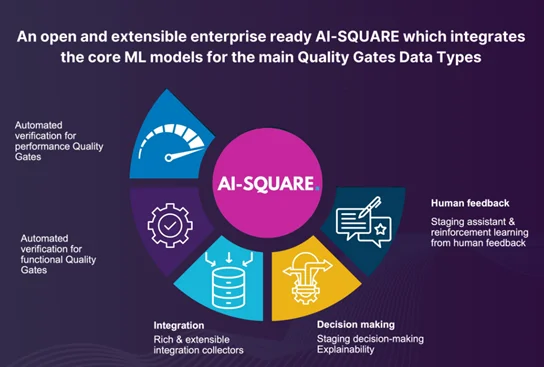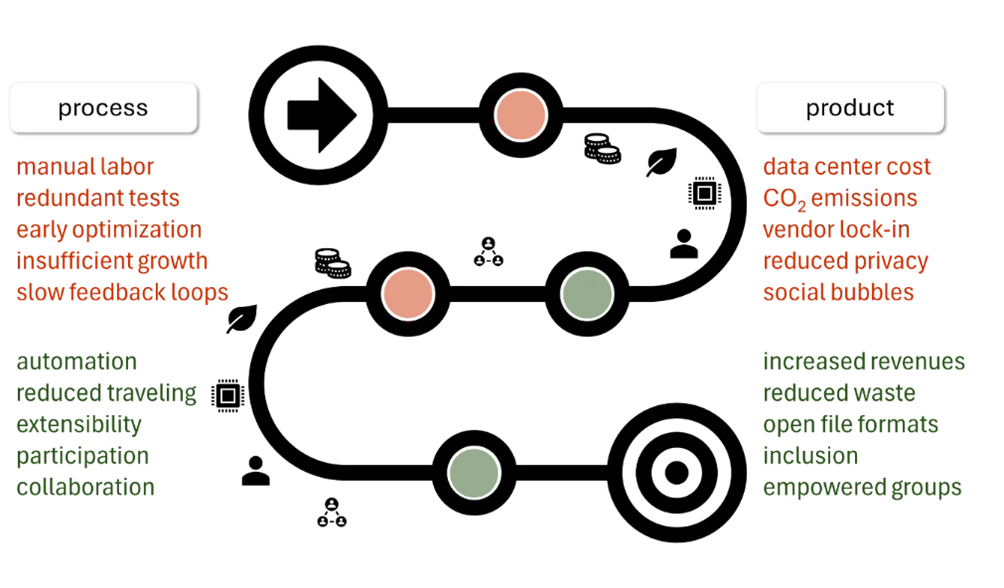Software Engineering
We enable sustainable Digital Transformation
The Software Engineering Research Group of the ZHAW is a leader in combining teaching and applied research. We are committed to educational excellence and setting standards where research innovation meets industry relevance. Our vision is to apply innovative software engineering methods and tools to improve software development efficiency and quality. We reduce the total cost of ownership and promote citizen development, enabling sustainable digital transformation.
LowCode & NoCode Software Engineering
In the area of low-code and no-code software engineering, our research advances AI-driven tools, domain-specific languages, and intelligent modeling assistants to enable rapid prototyping and empower citizen developers. We develop new software development paradigms that emphasize software traceability and user-centered requirements gathering, ensuring that systems are designed collaboratively — with people, not merely for them. Our main goals are:
🚀 Reduce Software Development Costs in Switzerland
By leveraging Low-Code and No-Code platforms, we customize software development methods and tools to significantly reduce the cost and time associated with traditional software development.
🛠️ Develop High-Quality Solutions Rapidly
Our research ensures that rapid development on Low-Code and No-Code platforms does not compromise the software's quality, security, or maintainability.
🧑💻 Tackle the Scarcity of Skilled Developers
With Low-Code and No-Code platforms, we empower businesses to create applications without requiring a team of highly specialized developers while maximizing citizen development.
🌍 Integrate Continuous Changes and New Requirements
Our research develops techniques for collecting requirements from different sources quickly and with minimal overhead, enabling continuous and agile delivery cycles.
Project examples in this research line
AI-driven decision-making platform for software staging management
AI-SQUARE is an innovative project funded by Innosuisse, dedicated to advancing decision support technologies in software staging management. Our collaboration brings together a team of experts from leading academic institutions and industry partners, including ZHAW, HE-Arc Ingénierie, HEPIA-GE, and Swiss Digital Network.
AI-based software factory for MedTech applications
As part of the Flagship SHIFT project funded by Innosuisse we develop a no-code technology to enable citizen development in hospitals, allowing health care experts to design and develop software for their services and needs. This solution intensively reduce time-to-market, and increase software quality.
Software Quality and Sustainability
In software quality and sustainability, our research develops comprehensive criteria and measurement tools to evaluate the sustainability of development processes, paradigms, and software products. We advance education and applied research in software quality standards and testing, the development life cycle, DevOps, software architectures, and software economics, promoting high-quality and sustainable software systems. Our main goals are:
🌱 Measure Software Impact and Sustainability
Our research on sustainable software helps companies measure their software systems' long-term environmental, economic, and social impact, ensuring alignment with sustainability goals.
🔍 Advancing software Engineering Paradigms
We explore how sustainability and quality criteria can be measured and integrated across the software development life cycle from architecture to DevOps—ensuring resilient and maintainable systems.
💡Seamless connection of software economics and testing
By connecting software economics with testing and design, we promote cost-effective, high-quality, and sustainable solutions.
🧩 Building robust software architectures
We investigate how robust software architectures can guide and enhance every phase of the software development life cycle, ensuring scalable and sustainable systems.
Project examples in this research line
Green and sustainable digitalization for the textile industry
By optimizing production in the textile industry, digitalization can help to reduce power consumption and thus, emissions of pollutants. Yet, digitalization itself creates emissions, e.g., by using powerful AI algorithms. There is currently no transparency for how digitalization investments can reduce emissions. In this this project conducted in collaboration with the Zürcher Stiftung für Textil-Forschung, we suggest effective measures to reduce the emissions due to digitalization.
Measuring Sustainable Development Practices
Software products and services must be sustainable to minimize their negative impact on people and the environment. Achieving this requires integrating sustainability considerations early in software engineering projects. For this we developed GitGauge —a tool that analyzes software repositories to compute quality and sustainability AI-powered metrics, offering an objective assessment of a project’s overall performance.
Industry pain points
We actively collaborate with industry practitioners to tackle key challenges in software engineering, including:
- How to integrate sustainable practices seamlessly in the early phases of software development?
- How to leverage artificial intelligence to assist citizen developers in formal software development life cycles?
- How to continuously validate requirements and maintain observability to uphold software quality?
- How to ensure traceability among evolving user needs and software architectures throughout the software development lifecycle?
Teaching and Training
Bachelor in Computer Science, Medical Informatics and Data Science. We are leading the courses on programming, software engineering and information systems in three bachelor programs in the school of Engineering. We actively involve our students in research topics from the beginning of their studies.
Continuing Education. Our CAS Software Engineering (German only) offers the opportunity to practitioners and career changers to learn the basics for building robust and sustainable IT systems and software products. The pedagogical program equips participants with proven principles, methods and tools. The CAS Software Engineering can be recognised as an elective CAS as part of the DAS Computer Science and the MAS Computer Science.
Master MSE program. We are also engaged in the MSE as research project advisors. Our students have successfully graduated and engaged as researchers in our projects.
PhD Projects
David Mosquera is developing MARPa, a method for low-code/no-code software that combines reusable requirement patterns with intelligent modeling assistance. MARPa supports collaborative and automated requirements engineering using domain-specific modeling, ontology-based reasoning, and natural language processing. Empirical studies show improved efficiency and effectiveness in LCNC contexts. Future work will focus on enhancing pattern usability and strengthening model integration and traceability. David's research has been shared at major conferences and published in leading journals.
Christian Birchler focuses on software engineering and testing methodologies for autonomous systems. His work includes developing tools for simulation-based testing, with particular attention to test selection, prioritization, and regression testing. He is involved in improving the reliability and efficiency of testing processes for self-driving vehicles in virtual environments. Christian regularly publishes his findings in academic journals and conferences, contributing to advancements in software quality assurance.
-
Birchler, Christian; Rohrbach, Cyrill; Kim, Hyeongkyun; Gambi, Alessio; Liu, Tianhai; Horneber, Jens; Kehrer, Timo; Panichella, Sebastiano,
2023.
TEASER : simulation-based CAN bus regression testing for self-driving cars software[paper].
In:
2023 38th IEEE/ACM International Conference on Automated Software Engineering (ASE).
38th IEEE/ACM International Conference on Automated Software Engineering (ASE), Kirchberg, Luxembourg, 11-15 September 2023.
IEEE.
pp. 2058-2061.
Available from: https://doi.org/10.1109/ASE56229.2023.00154
-
Ruiz, Marcela; Hu, Jin Yang; Dalpiaz, Fabiano,
2023.
Why don’t we trace? : a study on the barriers to software traceability in practice.
Requirements Engineering.
28(4), pp. 619-637.
Available from: https://doi.org/10.1007/s00766-023-00408-9
-
Birchler, Christian; Khatiri, Sajad; Bosshard, Bill; Gambi, Alessio; Panichella, Sebastiano,
2022.
Machine learning-based test selection for simulation-based testing of self-driving cars software.
arXiv.
Available from: https://doi.org/10.48550/arXiv.2212.04769
-
Noel, Rene; Panach, Jose Ignacio; Ruiz, Marcela; Pastor, Oscar,
2022.
Stra2Bis : a model-driven method for aligning business strategy and business processes[paper].
In:
Ralyté, Jolita; Chakravarthy, Sharma; Mohania, Mukesh; Jeusfeld, Manfred A.; Karlapalem, Kamalakar, eds.,
Conceptual Modeling.
41st International Conference on Conceptual Modeling (ER2022), Hyderabad, India, 17-20 October 2022.
Cham:
Springer.
pp. 255-270.
Lecture Notes in Computer Science ; 13607.
Available from: https://doi.org/10.1007/978-3-031-17995-2_18
-
2022.
The MERLIN method to create modeling assistants for model driven development tools[paper].
In:
van Looy, Amy; Weber, Barbara; Rosemann, Michael, eds.,
CAiSE 2022 Doctoral Consortium Proceedings.
34th International Conference on Advanced Information Systems Engineering (CAiSE), Leuven, Belgium, 6-10 June 2022.
Aachen:
RWTH Aachen University.
pp. 54-61.
CEUR Workshop Proceedings ; 3139.
Available from: https://doi.org/10.21256/zhaw-30651



